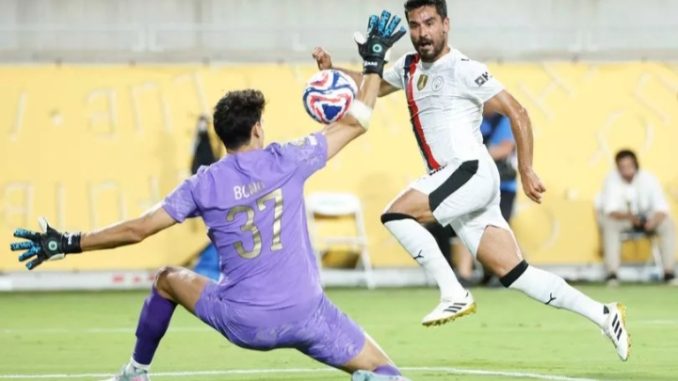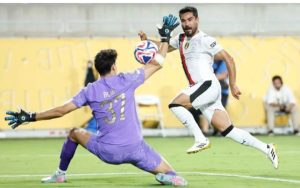
Opinion: Pep Guardiola Might Have to Do What He Hates After Manchester City Transfer Claim
Pep Guardiola, the mastermind behind Manchester City’s golden era, has rarely compromised on his footballing philosophy. Possession-based play, tactical precision, and squad control have defined his reign. Yet, with growing reports of key players departing and the club facing unexpected transfer hurdles, Guardiola may soon be forced into a scenario he has long despised: rebuilding his squad under pressure — and perhaps relying on a Plan B.
After years of meticulous squad evolution, a swirling storm of uncertainty now surrounds the Etihad. Rumors suggest that City could lose several first-team players in the same summer — including Ederson, Bernardo Silva, and João Cancelo — while also struggling to secure top targets in key positions. This mounting uncertainty may push Guardiola to embrace what he loathes most: reactive planning and squad improvisation.
A Disruptive Summer Taking Shape
Manchester City’s transfer windows under Guardiola have been characterized by long-term thinking. The club rarely gets involved in bidding wars, and Guardiola typically insists on signing players that fit his precise tactical needs. But this summer is beginning to spiral outside of that control.
With Ederson reportedly having reached a personal agreement with Galatasaray, and uncertainty still surrounding the futures of players like Bernardo Silva and Kevin De Bruyne, Guardiola faces the possibility of losing multiple experienced leaders. On top of that, the club’s pursuit of high-profile targets — such as Jamal Musiala, Florian Wirtz, or even Bruno Guimarães — has hit complications either due to price tags or player hesitancy.
This could lead to something Guardiola has famously tried to avoid during his time at City: making transfers he doesn’t fully believe in, or worse, relying on players not quite tailored for his style. He has always preferred smaller, flexible squads filled with intelligent, multi-functional players. But if exits outpace arrivals, that approach could be severely tested.
Why Guardiola Hates This Situation
Pep Guardiola is a control freak — in the best sense of the term. He values order, preparation, and the ability to sculpt his squad over time. One of his core coaching beliefs is that chaos undermines consistency. He wants players who understand his system inside-out, and he often takes months — sometimes seasons — to fully integrate new signings into the first team.
That’s why Guardiola has often said he dislikes squad overhauls or “rebuilds” during short windows. He wants evolution, not revolution.
In previous years, City’s recruitment strategy allowed him to do just that. Even when iconic players left — like David Silva, Sergio Agüero, or Vincent Kompany — their replacements were either already in place or gradually phased in. But if Bernardo, Ederson, Cancelo, and potentially Kalvin Phillips all leave in one window without clear replacements lined up, Guardiola may be forced into a reactive mode he finds deeply uncomfortable.
Plan B: Something Guardiola Rarely Likes to Use
Guardiola famously hates being backed into a corner. He prefers dictating the tempo of both games and seasons. But now, he may be pushed into doing what many managers regularly deal with — relying on short-term fixes, promoting youth earlier than planned, or even tweaking his tactical identity.
For instance, if Ederson leaves and no elite-level goalkeeper is brought in, Guardiola may need to rely on Stefan Ortega or bring in a lesser-known keeper without ideal distribution traits. Similarly, if Bernardo Silva exits without a proper creative replacement, it could mean changing his midfield structure or rushing the development of a youngster like Oscar Bobb.
It’s not that Guardiola isn’t capable of improvising — he’s one of the best tactical minds in history. But he deeply dislikes being forced into it. His success is built on careful orchestration, not firefighting.
Man City’s Transfer Strategy: Too Passive?
Some critics argue that City have become too passive in the market. While they pride themselves on avoiding inflated fees and respecting player desires, this restraint may now backfire. In today’s aggressive transfer landscape, hesitation can cost you key targets.
Arsenal and Liverpool, for example, have acted swiftly this summer. Chelsea — for all their chaos — continue to pursue younger talents with relentless ambition. City, on the other hand, appear to be waiting for dominoes to fall. That passive approach risks leaving Guardiola with fewer elite options as the season draws near.
More importantly, Guardiola is now entering what could be his final season at Manchester City. With his contract expiring in 2025 and no signs yet of an extension, this might be his last chance to dominate both England and Europe. For that, he needs a squad ready to fight on all fronts — not a patchwork team assembled in August.
Youth to the Rescue? Maybe, But It’s a Gamble
One solution often floated is relying more on the club’s youth setup. City’s academy is among the best in the world. The likes of Rico Lewis and Oscar Bobb have already proven they can contribute. Players like Micah Hamilton, Jacob Wright, or even Adedire Mebude (if retained) show promise.
But Guardiola has never thrown young players into high-pressure roles without due preparation. He believes in protecting talent from being overwhelmed too soon. A rushed promotion due to squad gaps is not his preferred method — it’s reactive, not proactive.
Still, if City can’t replace outgoing stars with ready-made talent, Guardiola may have no choice but to trust youth in ways he hasn’t before.
Tactical Tweaks on the Horizon?
Another uncomfortable adjustment Guardiola may face is reshaping his tactics around available personnel. For years, his system has depended on versatile players like Bernardo Silva and İlkay Gündoğan—midfielders who can control the ball, shift into wide areas, and press intelligently.
If those kinds of players aren’t available — either due to departures or lack of replacements — Pep might need to simplify or adjust his system. That could mean more direct play, traditional wingers, or even adapting formations more dramatically based on opponents.
Again, Guardiola is capable of this. His reinvention of John Stones as a hybrid midfielder/defender last season is a masterclass in adaptability. But wanting to evolve versus being forced to evolve are two very different things.
Final Thoughts: Time for Pep to Accept the Chaos?
Pep Guardiola may be one of the greatest coaches of all time, but even he isn’t immune to the unpredictability of modern football. For years, City insulated him from chaos with a well-run recruitment team and a deep, balanced squad. But this summer, cracks are beginning to show. If key exits aren’t matched with smart, timely arrivals, Pep may have to enter the one managerial zone he despises: damage control.
In that case, we could witness one of Guardiola’s most challenging — and revealing — seasons. Can he win without ideal conditions? Can he lead a squad through transition while still competing at the highest level? It may require him to compromise on his ideals, experiment under pressure, and manage personalities and performances with fewer levers of control.
It would be a poetic twist — the perfectionist forced to embrace imperfection. And perhaps, if Guardiola navigates this storm and still delivers
trophies, it will be the clearest proof yet of his genius.

Leave a Reply